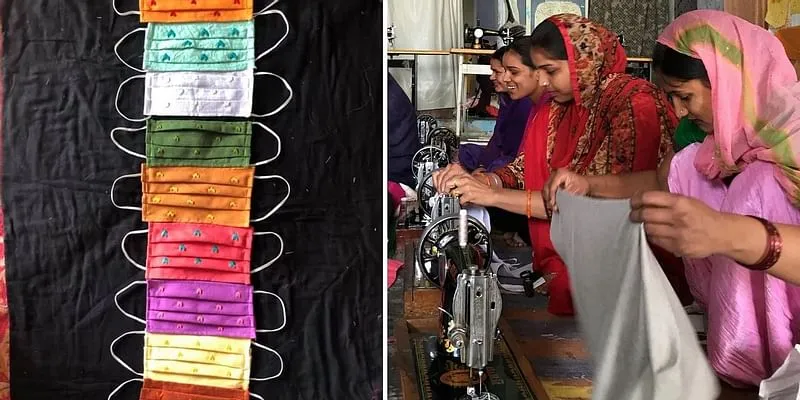These Phulkari masks made by women of Moonak have a bigger story to tell other than the pandemic
The Phulkari masks are metaphoric of the efforts put in by the widows of Moonak, who have become the representatives of women empowerment in these difficult times.
A few days ago, a 42-year-old Australian woman was seen flaunting a Phulkari mask on her social media page. With face masks becoming an essential part of our outfit, owing to the pandemic, many people are trying to make them interesting for people to wear.
This particular Phulkari mask was flown to the woman’s doorstep all the way from the Moonak village in the Sangrur district of Punjab. And it has a deeper story to tell other than the pandemic.
These Phulkari masks are metaphoric of the efforts put in by the widows of Moonak. These widows, who were in massive debts, were left to fend for themselves after their husbands committed suicide.
From 2015 to 2019, over 2,528 suicide-related deaths have been reported by the Punjab government. These deaths are caused primarily due to a decline in their income.
After their husband’s death, these women were forced to find an alternate source of income to raise their children, and Phulkari was their solution.

Image: The Quint
Phulkari, which translates to ‘flower work,’ is a form of embroidery that is done with silk threads, often on cotton clothes. The traditional handicraft from Punjab meant a lot more to the women of Moonak, who found a source of survival in it.
With the help of Ghazala Khan (46), who runs the NGO Building Bridges India (BBI), these women got the much-needed support and were able to turn it into a profitable venture. She helped procure the raw material, thread, rubber, and fabric for the masks for about 300 women.
"We didn’t have funds to buy land. I approached 10 different gurudwaras of Moonak village to give some space for this cause," Ghazala told News18.
The gurudwara authorities happily allotted free land for these women to continue their work. In fact, they have also provided these women with one-time meals, reported The Quint.
At present, the NGO has about 10 centres in 10 villages of Sangrur, each comprising of 25 to 30 girls and women. However, it was challenging at first to get most women to join it.
“Under the social pressure, women were not ready to step out of the houses and join the centre. They had this belief that talking about husband’s suicide would make them a villain in family and society,” said Ghazala.
These centres also support women who lost their jobs during the lockdown. Gaganpreet, who lost a teaching job, is now stitching these Phulkari masks. She said, “I am earning less, but at least I have something to do in such difficult times. This amount helps me in fulfilling my basic necessities.”
Each woman in these centres has a difficult story to tell, but are trying to find their way back into a normal life with this opportunity.
Do you have an interesting story to share? Please write to us at tci@yourstory.com. To stay updated with more positive news, please connect with us on Facebook and Twitter.
Edited by Suman Singh







